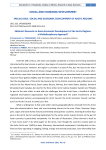Статьи журнала - Arctic and North
Все статьи: 972
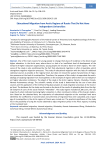
Educational Migration from Arctic Regions of Russia That Do Not Have Independent Universities
Статья научная
One of the main reasons for young people to change their place of residence is the desire to get higher education. In the Arctic zone, where there is a lack of or insufficient level of development of the network of higher education organizations, young people are forced to leave for other regions. The relevance of the study is also conditioned by the fact that educational migration is often irrevocable, which strengthens negative migration processes. The study of educational migration with the help of traditional statistical sources is possible at the regional level, but does not reveal the spatial characteristics of migration processes at the level of municipalities. Therefore, the purpose of this study is to approbate the methodology of studying migration from municipalities on the example of regions where there are no independent higher education institutions. The object of the study is the Arctic regions: Nenets, Chukotka, Yamalo-Nemets Autonomous okrugs. The scientific novelty of the study is determined by the use of new data sources and the application of the method of big data analysis to study migration processes at the municipal level. The database for the study was formed on the basis of the results of uploading data from the digital footprint of users of the social network “VKontakte”. The study regions included 15,186 users, the vast majority of whom indicated receiving higher education in other constituent entities of the Russian Federation. Based on the obtained data, the trajectories of educational migration at the municipal level were identified, the coefficients of concentration and uniformity of migration flow were calculated, and a typology of municipalities in the Arctic regions of Russia was carried out. The practical significance of the study lies in the possibility of using the results obtained to adjust migration policy in the Arctic regions, including at the municipal level.
Бесплатно
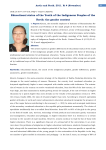
Educational status of the Youth of the Indigenous Peoples of the North: the gender context
Статья научная
The article reports on gender differences of educational status of the youth of the indigenous peoples of the North, analyzes the factor of becoming a professional and motivation for professional education. Young women of the North aimed at obtaining a professional education and expansion of social opportunities, while young men are guided by traditional ways of life. Educational status of young northerners defines their gender stratification.
Бесплатно
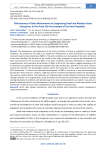
Статья научная
The development and exploration of the Arctic territories of Russia is important in the current conditions. The purpose of the study is to analyze the effectiveness of state mechanisms for supporting small and medium-sized enterprises (SMEs) in the Arctic conditions (on the example of the Arctic territories of the Komi Republic). On the basis of the results of the study, proposals to improve the effectiveness of these mechanisms for the survival of SMEs in the Arctic conditions have been developed. To improve the competitiveness and investment attractiveness of SMEs in the Arctic, the authors suggest developing a set of measures to strengthen the interaction between the state and business, primarily in the social, environmental and scientific and technological spheres within the framework of the public-private partnership (PPP) mechanism. To ensure the innovative development of SMEs in the Arctic, it was recommended to develop the “Arctic Venture” model as a high-tech tool for innovative development within the existing Russian venture capital industry. The importance of creating project-oriented business structures that conduct strategic analyses on an ongoing basis, study the impact of the external environment on business, identify existing development problems and develop projects to solve existing problems was noted. It was also proposed to elaborate tools for the development of corporate governance system in small and medium-sized enterprises in order to ensure their competitiveness and investment attractiveness.
Бесплатно
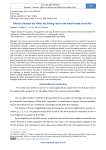
Efforts to Restore the White Sea Fishing Fleet in the Initial Period of the NEP
Статья научная
The recovery period of the early 1920s in Soviet Russia coincided with the search for new forms of production management and was complicated not only by economic devastation, but also by the difficult international situation, political and economic blockade of the country. Under such conditions, the long overdue task of modernization of fishing and fur-trading was solved in the Arkhangelsk province, which first of all required providing the fishermen with the newest vessels. Lack of coal did not allow using steam vessels in full measure in the fishery; purchase and construction of vessels at foreign shipyards were also difficult. Therefore, it was decided to restore peasant shipyards as a temporary measure, centrally organizing the construction of small fishing vessels under the supervision of qualified technicians. The models used were Norwegian-built sailing, rowing and motor vessels, which were considered to be the most suitable for fishing in the White Sea and Arctic Ocean. The difficulties that the economic institutions had to face during the transition period (from war communism to the new economic policy) are considered in this article with the help of a large set of archival and published sources. The transition to the use of trawlers and icebreakers is explained not only by the tasks of modernization of the fishing economy, but also by the revolutionary ideology: to prevent conditions for the emergence of a prosperous layer of the Pomor population, which included shipbuilders and shipowners.
Бесплатно
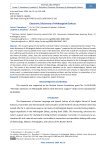
Electronic Dictionary of Arkhangelsk Dialects
Статья научная
The research group of the Northern (Arctic) Federal University is implementing the project “Thematic dictionary of Arkhangelsk dialects with electronic support” supported by the Russian Science Foundation. The project aims to publish three issues of the dictionary, which will include the vocabulary reflecting the traditional world picture of the Arkhangelsk peasant: the first issue contains the vocabulary related to the names of clothes, shoes, hats; the second issue contains the names of residential and non-residential buildings; the third issue contains the vocabulary naming the food and drinks of the Arkhangelsk inhabitant. The second task of the project is to create an electronic dialect corpus devoted to the Arkhangelsk dialects, which is currently not available in universities of the North-West region. The article presents the experience of the project, which is at the intersection of dialectology, ethnography, cultural studies and corpus linguistics. The results of this research and the electronic database can be used in dialectological, folklore and ethnographic expeditions, in teaching Russian literature at universities and schools, in organization of local history work, in educational projects aimed at promoting northern spiritual culture, in preparation of cultural and scientific events devoted to the language and culture of the Russian North.
Бесплатно
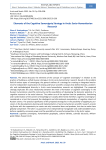
Elements of the Cognitive Sovereignty Strategy in Arctic Socio-Humanitarian Research.
Статья научная
The article discusses the elements of the concept of “cognitive sovereignty” in relation to the practice of building a unified Russian strategy in Arctic socio-humanitarian research. Based on the problem field of various types of sovereignty, the general outlines of a strategy for creating an integrated mechanism for independent examination of existing and future scientific concepts that define thematic, problematic and methodological diversity in Arctic socio-humanitarian research are highlighted. The proposed strategy explicates the close relationship between the level of formation of cognitive sovereignty in the Russian humanitarian scientific community and the possibilities of developing the domestic potential of a cognitive resource in the social sciences. The authors are of the opinion that the production, functioning and transformation of the content of knowledge are socially determined; therefore, cognitive sovereignty is considered as a tool that prevents the ideological and informational manipulation of cognitive intents of Russian science. The practical significance of the proposed strategy lies in the possibility of applying its provisions in the development, planning and implementation of socio-humanitarian scientific research, providing Russia with the opportunity to create not only innovative ideas and products, but also to make them globally competitive. The latter is a guarantee of an independently manageable and understandable future, defense capability, economic power and the possibility of successful competition in the Arctic region.
Бесплатно
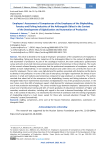
Статья научная
The article is devoted to the study of employers’ perceptions of the competences of employees in the shipbuilding, fishing and forestry industries of the Arkhangelsk Oblast in the context of digitalization and automation of production. As part of the sociological research, the team conducted a questionnaire survey and semi-structured interviews among representatives of enterprises in these industries. The results of the research allowed drawing conclusions that the professional competencies of employees, as well as abilities to work independently, in non-standard situations and under stress are currently the most in demand for employers. There is also a very high demand for qualities associated with discipline and the desire to develop in the profession. In terms of the size of enterprises, the higher requirement for almost all competences in small and medium-sized enterprises compared to large employers is noteworthy. The authors conclude that about half of the enterprises in the shipbuilding, forestry and fishing industries of the Arkhangelsk Oblast have implemented automation and digitalization into all key production processes. In the near future, more than 50% of employers expect a high demand for employee competencies related to the use of new production technologies. The survey revealed a gap between employers’ expectations and the actual level of professional training and skills of recent graduates of educational institutions of higher and secondary vocational education, including with regard to the most in-demand knowledge, skills and abilities. In the context of industries, it is noteworthy that the level of satisfaction with the training of graduates of shipbuilding industry is much lower, except for those who received education through the “Plant-University” system (Severodvinsk).
Бесплатно
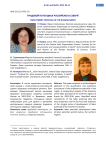
Employment potential of the Russian North
Статья научная
This paper proposes a methodological approach to the quantitative and qualitative assessment of the employment potential of the region. A comparative analysis of the dynamics of the labor potential of the northern regions of Russia for 2002-2010 years. Identified which components of the labor potential play the most important role for the level and dynamics of the integral index of development of labor potential of the northern territories.
Бесплатно
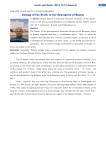
Energy of the North to the Synergetic of Russia
Статья научная
The history of the administrative-territorial division of the European North of Russia suggests that only a consolidated region, which is united by common interests province, territory, economic region, it can play a role of a springboard development of Arctic areas. A new model of territorial organization, able to convert energy of the North to synergetic of Russia, reflects the author of the article.
Бесплатно
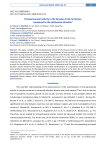
Entrepreneurial activity in the Russian Arctic territories compared to the All-Russian situation
Статья научная
The paper considers the entrepreneurial activity of the Russian Arctic territories and reveals its specificity compared to the all-Russian situation. The relevance of the scientific task is determined by the fact that ensuring economic growth and social development of the Russian Arctic is impossible without the necessary strengthening of entrepreneurial activity. The search for a mechanism for managing Arctic entrepreneurship is currently an urgent scientific task. The paper presents the authors' estimates of the entrepreneurial activity of the Russian Arctic territories compared to the all-Russian situation. The authors present the classification of the territories of the Russian Federation and the Russian Arctic by the principal business activity related to the subject of the market manifesting it. It is argued the Arctic specificity, and local conditions determine the development of entrepreneurial activity in the Arctic for such market actors as business and the state. This feature allowed us to offer and justify recommendations to stimulate entrepreneurial activity regarding the belonging of the Arctic to a classification group.
Бесплатно
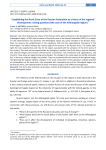
Статья научная
The article describes the impact of the Russian Arctic policy activation on the development of the Arkhangelsk region. In 2013, the formation of the Arctic zone of the Russian Federation (AZRF) as an object of state administration was launched. The Arkhangelsk region was partly included in the Russian Arctic. Now, we observe the establishment of the regulatory field and the organizational framework of the macroregion. The article analyzes the current stage of this process in the Russian Arctic. The author high-lights the main opportunities and risks for the region associated with the activation of the Arctic policy of the country. The most serious opportunities are emerging in politics (the Arctic status, external relations and external image) and economy (infrastructure, investments, new enterprises and organizations, and tourism). These areas are experiencing some changes. The changes in the social space are hardly noticeable but, in this area, cardinal changes are possible. They are associated with the renewal of the regional image, strengthening the regional identity, changes in the social composition of the population and the potential of municipalities. At the same time, risks associated with incomplete entry of the Arkhangelsk region into the Russian Arctic, the implementation of major investment projects and inefficient management.
Бесплатно
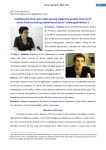
Статья научная
The model of public policies aimed at the inclusion of European Nenets in the national legal space is analyzed. A large amount of published evidences of officials and travelers, as well as the archive materials show both positive and unsuccessful consequences of this policy, similar to the imperial, early Soviet, Soviet and post-Soviet ones. The issue of cultural sustainability of the Nenets ethnos that has developed mechanisms to counter internal and external forces destructive for their ethnic unity is discussed.
Бесплатно
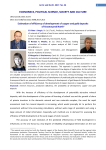
Estimation of efficiency of development of copper and gold deposits of Krasnoyarsk North
Статья научная
The article presents the probable approach to the assessment of the availability of the mineral deposits. This approach is specially created for initial estimation of resourses and reserves of low degree of exploration. As the initial data the most significant parameters of a deposit are used, which can be proved objectively. These parameters are valuable components in ore, volumes of ore reserves, strip ratio, mining technology. The results of preliminary economic estimation of efficiency of development of predicted gold and copper deposits of the Krasnoyarsk North are presented. Economic efficiency of development of gold deposits Nizhnelitkinskoye, Groznenskoye, and Zhilnoye are estimated. The development of copper deposits is inexpedient.
Бесплатно







